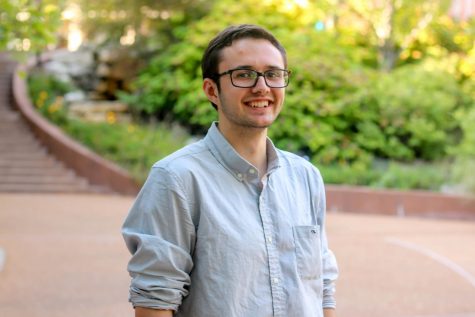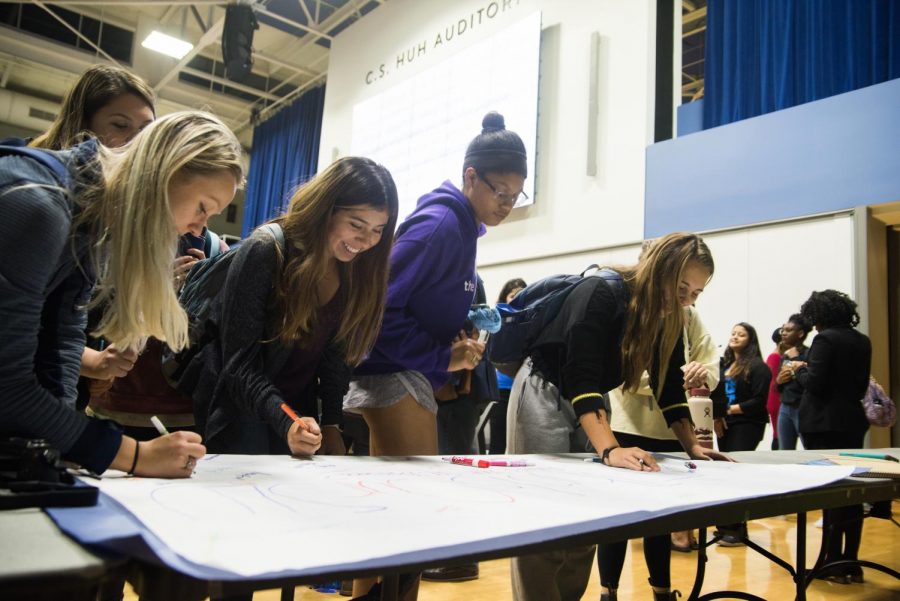OccupySLU: Progress Through Memory
This week, the Office of Diversity and Community Engagement hosted OccupySLU Week to commemorate the 2014 Occupy SLU Protests, which are best remembered for a week-long sit-in at the SLU clock tower.
In the summer of 2014, the killing of unarmed teenager Michael Brown by a Ferguson police officer sparked a national conversation about racial tensions and systemic racism in the United States. In early October 2014, Vonderrit Myers, the 18-year-old son of a SLU delivery worker, was killed by a police officer. As part of the Ferguson October demonstrations, there was an event held at Chaifetz Arena, as well a protest and vigil for Myers several miles away. Students, community members and activists from these events and elsewhere began to march to SLU and occupy the space around the clock tower.
Many protesters camped out for the week in order to highlight the issues of race, equality, systemic and institutional racism, and the experience of SLU students of color. Daily “teach-ins” were held at the clock tower so that community members could engage in discussion and learn more about the issues. The Occupy SLU protests concluded with the drafting of the Clock Tower Accords—a list of thirteen resolutions aimed at highlighting and solving the issues raised by the protesters. These demands are in various stages of implementation, and in the eyes of many, there is significant progress to be made.
Luella Loseille, the Atlas Program Coordinator, was a sophomore at SLU when Occupy SLU took place and is now leading the commemorative programs this year. Loseille remembered the tensions on campus during the protest, and that many people felt the Occupy SLU was an opportunity to finally hold SLU accountable to their mission. While progress has been made, Loseille is still reluctant to say that SLU currently lives up to its mission when “marginalized communities are having horrible experiences” on campus. The current undergraduate population of SLU was not present for the Occupy SLU protests, and Loseille believes that the commemoration of the event is an important step in ensuring that the Clocktower Accords are fulfilled.
“These problems still persist,” said Loseille. “I think that since Occupy SLU, the university has done a better job of recognizing the systems at play such as racism, classism, sexism, homophobia and transphobia, ableism, etc. that influence the decisions and actions of the University. I can attest that some of the conversations we have on campus today probably would not have been common on campus more than five years ago, but there are still many more conversations that need to be had to create and maintain an inclusive and respectful environment for all.”
The events of Occupy SLU Week began on Monday with the annual reading of the speech given by Dr. Martin Luther King Jr. at SLU. “So many of the things he [Dr. King] expressed in that speech are still so relevant,” said Loseille, “You could take any line of that speech and apply it today.”
On Tuesday, the #ThisIsOurSLU Teach-In was held. At this event, attendees spent time learning about and remembering the Occupy SLU protests. They also participated in breakout groups where they learned about current issues of marginalized groups on campus and discussed ways these issues could be solved. Loseille said this event was designed to mimic the teach-ins held during Occupy SLU.
The theme, #ThisIsOurSLU, is also the theme of a current photo campaign being undertaken by the Office of Diversity and Community Engagement and the Cross-Cultural Center. Photos of SLU students will be posted along with their stories of experiences here at SLU. The goal is to highlight both the negative and positive experiences of SLU students to create an accurate picture of the campus life here at the University.
On Thursday, the final event will be a screening of the movie “Whose Streets,” followed by reflection and discussion of the film’s themes. “Whose Streets” is a documentary focusing on the activists and community members involved with the Ferguson protests following the killing of Michael Brown.
Loseille said that these events are extremely important as the true goals of the Occupy SLU protests have not been fully realized, and it is therefore vital that students are aware of the work that is left to be done. Once students accept the responsibility for bringing SLU’s environment in line with its professed values, they can actively work to effect change through research and education, reversal of personal biases and advocacy work.
Your donation will support the student journalists of Saint Louis University.





